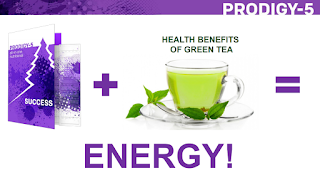Feeling tired? lack of energy?
HEALTH BENEFITS OF GREEN TEA
ENERGY & PERFORMANCE
• In one study in 10 healthy men, green tea increased
energy expenditure by 4%
http://www.ncbi.nlm.nih.gov/pubmed/10584049
• By mobilizing fatty acids from the fat tissues and making
them available for use as energy, caffeine itself has also
been shown to improve physical performance.
http://europepmc.org/abstract/MED/723503/
• In 2 different studies physical performance was
improved by 11-12% on average from caffeine.
http://www.ncbi.nlm.nih.gov/pubmed/15657469/
GREEN TEA ENERGY
• Helps increase energy and mental focus. Green tea contains a small amount of caffeine, which a
2008 study in Nutrition Bulletin found can improve mood, cognitive function and physical
performance. Green tea contains less caffeine than does coffee.
• Provides L-theanine, an amino acid shown to promote a state of calm awareness. Bottom line,
green tea provides the benefits of alertness associated with caffeine without the "jittery"
feeling often experienced as a side effect of coffee.
• Improves various aspects of brain function, including improved mood, vigilance, reaction
time and memory.
Ruxton, C. H. S. "The impact of caffeine on
mood, cognitive function, performance and
hydration: a review of benefits and
risks." Nutrition Bulletin 33, no. 1 (2008): 15-
25
• L-theanine helps to increase the neurotransmitters, GABA, which has and anti anxiety effect, and increases dopamine and the production of alpha waves in the brain.
• Because of the L-theanine and the smaller dose of caffeine, green tea can give you a much milder and different kind of “ENERGY” than coffee.
• Many people report having more stable energy and being much more productive when they drank green tea, compared to coffee.
http://www.ncbi.nlm.nih.gov/pubmed/17182482
http://www.ncbi.nlm.nih.gov/pubmed/18296328
https://www.jstage.jst.go.jp/article/jphs/105/2/105_2_211/_article
Research has found that green tea may help improve brain function in the short
term, and it may also protect your brain in old age.
• Multiple studies show that the catechin compounds in green tea can have various protective effects on neurons in test tubes and animal models.
http://www.ncbi.nlm.nih.gov/pubmed/19040558
http://www.ncbi.nlm.nih.gov/pubmed/15350981
OTHER BENEFITS
• Studies show that green tea can improve insulin sensitivity.
https://www.ncbi.nlm.nih.gov/pubmed/23803878
• In a study done with Japanese people they found that those
who drank the most green tea had a 42% lower risk of
developing type II diabetes.
http://www.ncbi.nlm.nih.gov/pubmed/16618952
• In 7 different studies with a total of 286,701 individuals, green
tea drinkers had an 18% lower risk of becoming diabetic.
http://archinte.jamanetwork.com/article.aspx?articleid=773949
• One of the more powerful compounds in green tea is the
antioxidant EGCG.
• It is loaded with polyphenols like flavonoids and catechins,
which function as powerful antioxidants • Green tea contains the potent antioxidant EGCG, which is
high in polyphenols.
http://europepmc.org/abstract/MED/8617188
In a statement by Swen Wolfram, PhD, from Basel, Switzerland, he stated the
following, “Due to the tremendous interest of the public and the scientific
community, the health benefits of green tea were extensively investigated during
the past few years. No other traditional beverage has received such widespread
scientific attention, and knowledge about its positive effects is exceptional. The
various health benefits of regular green tea consumption may finally result in a
prolonged life span.”
http://www.lifeextension.com/magazine/2008/4/new-research-on-the-health-benefits-of-green-tea/Page-01
ALL MEMBERSHIP FEES
HAVE BEEN WAIVED!
Now through Paris (October 31, 2016)
Click here to join!












